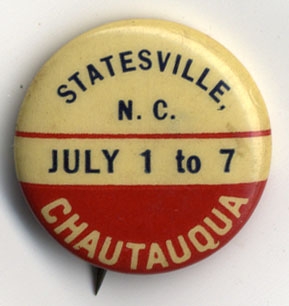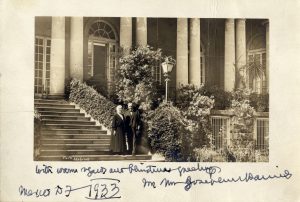
Notes from a recent week at the Chautauqua Institution in western New York state:
— During the late 1800s and early 1900s (before radio and the Depression) the Chautauqua Movement spread adult education across the land in a variety of forms, first with Daughter Chautauquas, later with touring tent Chautauquas.
From what I could piece together from the Chautauqua archives, the closest North Carolina came to establishing a Daughter Chautauqua may have been at Lake Junaluska. According to a surviving flyer, William Jennings Bryan headlined the “Chautauqua Features” during the 1916 session.
Using the Chautauqua brand requires no approval from the founders, so it has been borrowed often (and casually) as a label for adult ed projects. In 1979 the Chautauqua Institution received an inquiry from Mary Jo Clark, “Chautauqua project coordinator” for the N.C. Department of Cultural Resources, who had “received a grant to develop a comprehensive plan for a North Carolina Chautauqua”…. Does anyone know the fate of that idea?
— Summer regulars frequently trace the name of Chautauqua Lake to a Native American word meaning “bag tied in the middle,” a reference to the lake’s narrow midsection. But Chautauqua archivist Jonathan Schmitz acknowledges the North Carolina Gazetteer’s version as at least as feasible:
“Chattoka, a Tuscarora Indian village appearing on the Lawson map, 1709, and the Moll map, 1729, between the Neuse and Trent Rivers, central Craven County. The name meant ‘where the fish are taken out.’ When the Tuscarora Indians moved to [that is, fled to] New York, they took the name with them and it has survived as Chautauqua.”
— Finally, in a week of delights from far afield, what a provincial thrill to hear the always provocative Bishop John Shelby Spong, a Charlotte native, and to meet Patricia McBride, associate artistic director of North Carolina Dance Theatre, which serves each year as Chautauqua’s resident ballet company.
Pictured: A pinback button from a “circuit” or “tent” Chautauqua.


